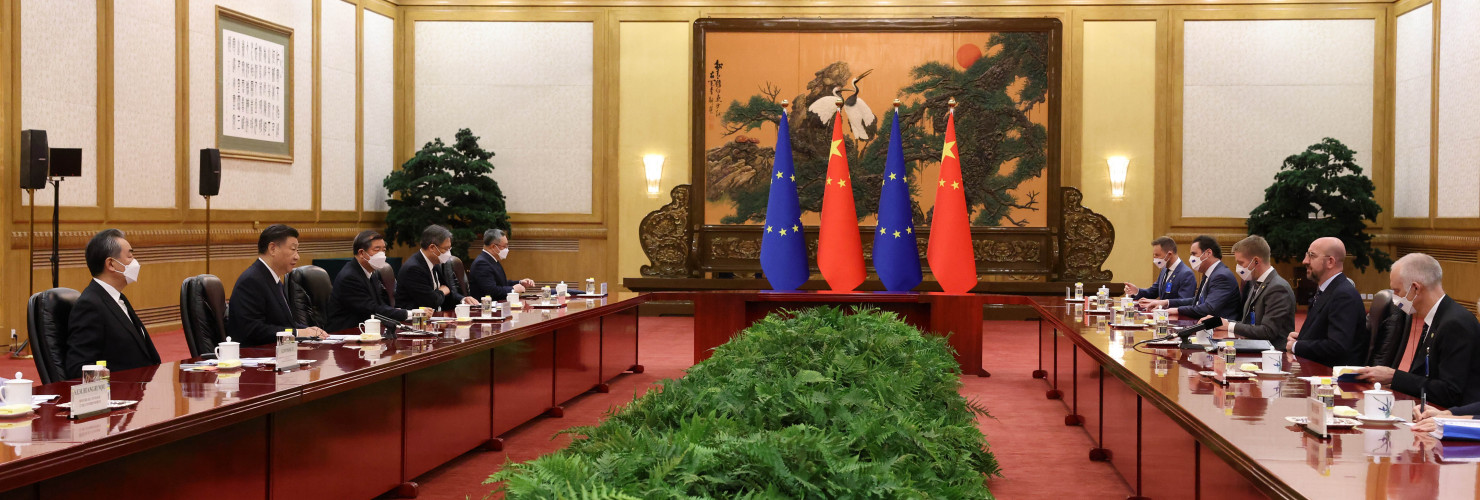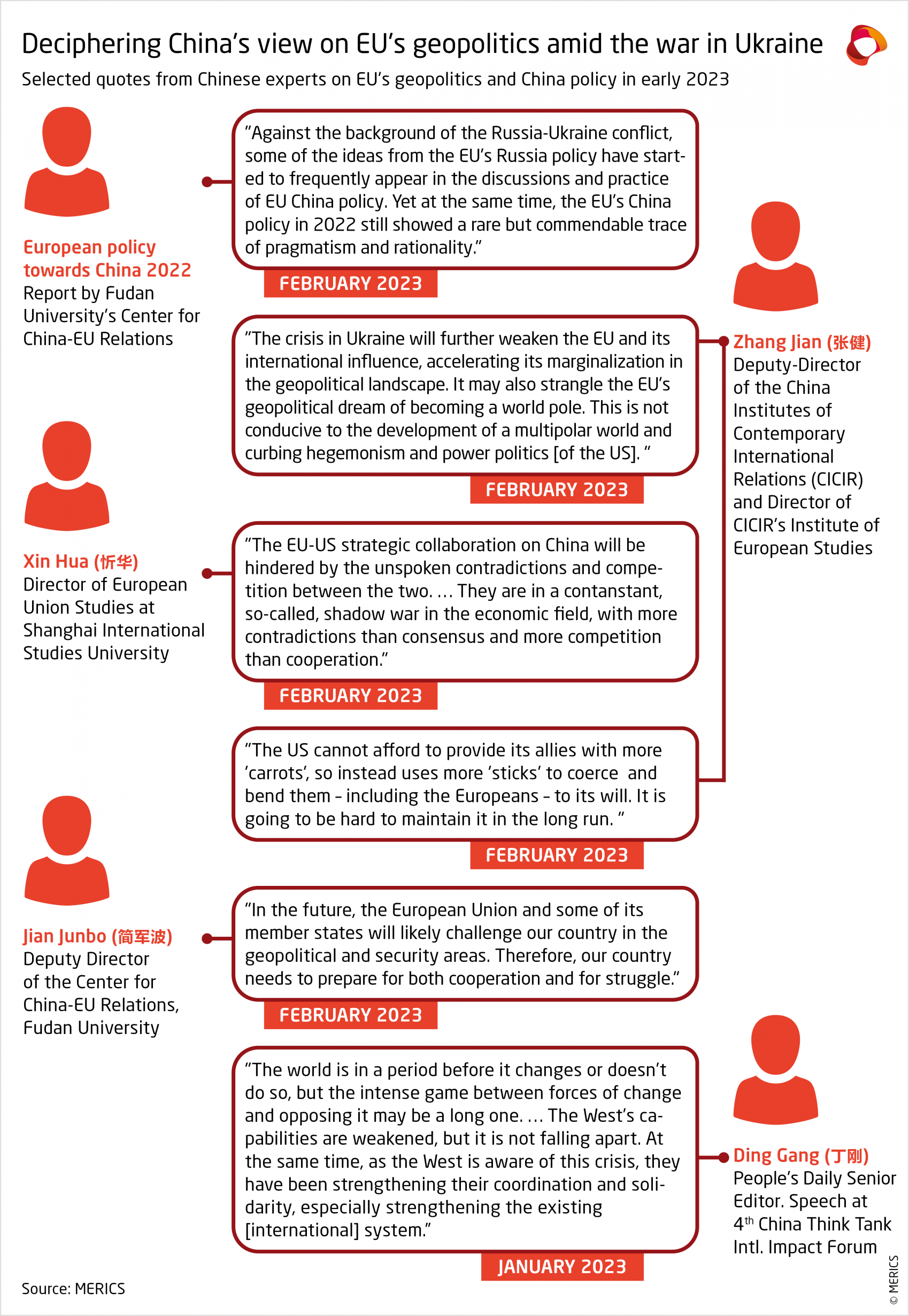

China debates on the EU's geopolitical standing + European leaders' visits to Beijing
Analysis
China Debates: EU’s geopolitical standing and EU-China relations in the second year of Russia’s war against Ukraine
By Grzegorz Stec
As the Russian war in Ukraine moves into its second year, how do Chinese think-tank experts and intellectuals evaluate the geopolitical standing of the EU and the prospects for EU-China relations? Last August, many of them argued that the EU’s position regarding the war was characterized by a contradiction between deepening dependence on the US and an increasing desire for strategic autonomy in European capitals. That contradiction could, they argued, give China some strategic space to navigate its increasingly challenging relationship with the EU.
Much has happened since then. Beijing launched a charm offensive on Europe, the Biden administration’s Inflation Reduction Act caused frictions this side of the Atlantic, and Sino-American tensions spiked once again, all the while Russia’s war in Ukraine drags on. This has prompted Beijing to release a position paper, branded as a peace plan, in an attempt to limit the political costs of its support for Moscow.
Evaluating the developments of the past year, a Fudan University study suggests that Russia’s war facilitated some of the EU’s Russia policy to spill over into its China policy. Despite this negative implication, the report maintains that some “pragmatism and rationality” continues to be a feature of the EU’s China policy.
Compared to last year, EU-China relations may have stabilized over a shared desire for economic stability. Yet, they still lack a strong base that could prevent strategic divergence over the long-term. And even though Chinese experts’ discussions are dominated by hopes of transatlantic frictions incentivizing the EU to re-engage with China, the improbable nature of such hopes is starting to feature more explicitly in their writing.
The EU’s weakening and transatlantic frictions as opportunities for China
Chinese experts largely agree that the EU has been significantly weakened in the aftermath of the “Ukraine conflict,” diminishing its position as a geopolitical actor. That is regarded as an unwelcome development for China, as it limits the number of geopolitical poles and strengthens the United States by increasing Washington’s influence in European capitals.
Yet, several Chinese experts point to tensions between the EU and the US. For example, Xin Hua refers to an “economic shadow war” between transatlantic partners, while Zhang Jian maintains that the US is re-industrializing at the expense of a de-industrializing Europe. The logic then goes that the EU has an interest in rebalancing its challenging relations with the US, through engagement with China, to increase its “strategic room to maneuver.”
An example of an arena where several Chinese experts see those dynamics play out is NATO, the increasing Asia portfolio of which continues to be one of the key concerns for China in relation to Europe. The experts point to the fact that, on more than one occasion, European NATO allies expressed reluctance to insert China-related points into the organization’s guiding document, the Strategic Concept, and into the joint EU-NATO declaration – the publication of which was supposedly delayed over disagreements on the inclusion of China-related points.
Shaky common ground
Many Chinese experts see this combination of EU reluctance paired with transatlantic economic tensions as a basis for improving EU-China relations. Glossing over fundamental differences between the EU and China, they fail to highlight any concrete goals the EU and China should strive to achieve. The focus is put on a presumed set of shared reservations towards Washington’s agenda, but fails to appreciate the values-related proximity between transatlantic partners and the fact that many in Europe do not see distancing from the US as an advisable course of action within the current geopolitical context.
A few experts are starting to openly contemplate that the EU may not be a constructive long-term partner for China. Jian Junbo argues that China needs to prepare for a “struggle” with the EU that would ultimately challenge it in “geopolitical and security areas.” His comments point to a lack of strategic trust which remains to be the key challenge – something that should not come as a surprise among systemic rivals. In that context, as shown by the discussions at the 4th China Think Tank International Impact Forum, certain debates are signaling a turn towards acknowledging the potential for the “West” (西方) to make a coordinated response to the challenges currently facing the international system.
Takeaways for the EU
Extrapolating from the position of the Chinese experts, the EU should be aware that, as things currently stand, it is likely to be seen by China as part of the problem than part of the solution in realizing its strategic interests over the long term. That makes cooperation offers temporary and geared towards limiting the level of EU opposition to Chinese interests. While such stabilization offers may be in the EU’s tactical interest, they should not inform the EU’s long-term strategy, which should be firmly grounded in a realistic evaluation of China’s objectives.
The exploitation of transatlantic frictions and specific aspects of strategic autonomy aspirations form the premise of China’s re-engagement with the EU. Given the lack of strategic trust, China is prepared only to propose a thinly veiled anti-American agenda to the EU. This shows how China’s EU policy is effectively an extension of its US policy. The EU should be clear-eyed about Beijing’s approach and not delay its preparations for potential future disruptions to EU-China relations.
Read more:
- Quote 1: Fudan University [CN]: “European policy towards China 2022” report
- Quote 2: Zhang Jian [CN]: Prospects for the development of the European Union amid the Ukraine crisis
- Quote 3: Xin Hua [CN]: Comments on the strategic cooperation between the United States and Europe in economic competition with China
- Quote 4: Zhang Jian [CN]: It's about China! The EU’s and NATO’s plans
- Quote 5: Jian Junbo [CN]: China-EU relations in 2023: Promising prospects for cooperation, but challenges that cannot be ignored
- Quote 6 Ding Gang [CN]: Why is it said that the Russia-Ukraine conflict has changed Europeans' view of China?
- Sinification: EU-China Relations and the War in Ukraine: A Reappraisal
Recommended reading
China’s attempt at stalling the EU
As domestic economic pressures and tensions with the US grow, Beijing’s been trying to make nice with Europe – largely to achieve three strategic goals. But this shouldn’t stall decisions about the bloc’s China policy.
Read the opinion piece by MERICS Analyst Grzegorz Stec for Politico: China’s EU policy and the art of strategic stalling
Update
Europe may go to Beijing, but the relationship struggles to improve
As soon as China opened its frontiers, European leaders began to explore possible state visits to Beijing. However, the visits are unlikely to bring a significant improvement in the relationship between European capitals and Beijing.
What you need to know:
- Macron, Meloni, von der Leyen, and Michel: Paris and Rome were two stops on Wang Yi’s visit to Europe where China’s top diplomat followed up on Beijing’s pending return invitations. While a date is yet to be decided for Italian PM Meloni’s visit, Macron, on the other hand, has officially announced that he will visit Beijing at the beginning of April. However, no mention has been made of European Commission President Ursula von der Leyen accompanying him, as was previously expected. China’s ambassador to the EU, Fu Cong, has in fact revealed to the Global Times that preparations for a visit by von der Leyen and Charles Michel to Beijing in the first half of 2023 are ongoing.
- What’s on the agenda? Resuming regular exchanges with Chinese counterparts and re-opening direct channels of communications are the main objectives of these visits. The visit by Scholz and Michel have amongst other things sought to convey the importance of the war in Ukraine for Europeans, but that does not seem to have changed the position of Beijing towards the matter. According to recent communications, Ukraine will remain on top of the agenda for the visit of the French President. Unlike Scholz, Macron will not be going with a French business delegation, but that does not mean that business is not high on the agenda of the French President or of other European leaders for that matter.
- Indications that EU-China relations will measurably improve? Unlikely. In January, we had mentioned the optimism of China’s Ambassador to the EU, Fu Cong, to revive the Comprehensive Agreement on Investment (CAI) by proposing Brussels and Beijing's simultaneous lifting of sanctions imposed in 2021. The proposal did not receive the warm welcome Fu Cong may have desired; without addressing the root cause for the EU’s imposition of sanctions – the Chinese government’s egregious violations of human rights in Xinjiang – then, there is no hope of revival. Disregarding the lack of progress on CAI or sanctions, the EU Commission’s banning of Chinese-owned app, TikTok, from work devices of its employees, surely won’t help EU-China relations.
What to watch:
China’s position paper on the war in Ukraine has not been received with the enthusiasm Beijing may have hoped. Even High Representative Josep Borrell, who in the past had expressed his hope for China’s role as positive contributor to the resolution of the war, highlighted the fact that the so-called peace plan “does not distinguish the aggressor from the victim.”
China’s decision to address only the symptoms and not the root cause of China-EU issues will bring about a slow yet certain realization that relations cannot so easily be mended. If the high-level visits from European leaders do not deliver what China hopes, expect the tone of communications from China towards the EU to dampen further. However, Beijing is likely to offer low-hanging fruit to Macron in the hope of winning over one of the –historically speaking – more US-sceptic EU member states.
Read more:
- MERICS Europe China 360°: EU-China relations under Swedish presidency + China's new EU ambassador
- South China Morning Post: EU rejects Beijing’s ‘misplaced’ plan for peace in Ukraine
- France 24: Macron to visit China, calls on Beijing to pressure Putin on Ukraine
Short takes
EU-China summit by mid-2023?
China’s Ambassador to the EU, Fu Cong, was quoted in the Global Times saying that the EU-China summit may take place in the first half of the year. This would entail a visit by European Commission President Ursula von der Leyen and European Council President Charles Michel to China. Still, there are no clear indications that the summit will take place by that date.
- Global Times: China, EU to usher in frequent high-level mutual visits soon, says Chinese ambassador to EU
- Reuters: China's EU ambassador says EU leaders may visit China by mid-2023
EU is yet to receive US’ evidence of China’s plans to send weapons to Russia
The statement came from the European Commission President Ursula von der Leyen. Other voices in the EU continued to underline that such a move by Beijing would amount to crossing the EU’s red line.
- Radio Free Europe: No Evidence 'So Far' That China Is Mulling Arms Deliveries To Russia, EU Chief Says
- Reuters: EU official warns of sanctions if China crosses 'red line' and arms Russia
European Parliament follows European Commission and EU Council to ban staff from using TikTok on its corporate mobile devices
The unprecedented decision applies to more than 43,000 employees and comes amid cybersecurity concerns. European Commission and Council of the EU staff is also now required to remove the Bytedance application from their personal devices if they have work-related apps on them. In reaction, Bytedance now intends to rely on a local partner to store user data (replicating a model it uses in the US).
- European Commission: Commission strengthens cybersecurity and suspends the use of TikTok on its corporate devices
- Euractiv: European Commission bans TikTok from corporate devices
- Politico: EU Parliament bans staff from using TikTok over ‘cybersecurity concerns’
EU upholds countervailing duties on Chinese companies operating from Egypt
The EU General Court ruled that Chinese subsidies can be attributed to Egypt – and by extension to other third countries – as the country of origin or export. The ruling pertains to countervailing duties imposed on products produced by Chinese-owned and China-subsidized companies established in the China-Egypt Suez Economic and Trade Cooperation Zone. The ruling possibly opens up innovative uses of EU trade defense instruments in the future.
- Court of Justice: Judgments of the General Court in Case T-480/20 and T-540/20 | Hengshi Egypt Fiberglass Fabrics and Jushi Egypt for Fiberglass Industry v Commission
- MERICS: Chasing the ghost of transatlantic cooperation to level the playing field with China: time for action
Hungary breaks ranks to support China’s “peace proposal”
Hungarian Prime Minister Viktor Orbán voiced support for China’s position paper on the war in Ukraine, adding that Hungary will not deliver any weapons to Kyiv. This contrasts with the position of EU leaders who have previously rejected the paper. Orbán’s move followed a visit from China’s top diplomat Wang Yi to Hungary (part of his visit to other EU member states and Russia).
- South China Morning Post: Breaking with EU, Hungary’s leader backs China’s peace proposal for Ukraine war
- Wall Street Journal: Hungary Extends Warm Welcome to Top Chinese Diplomat
EU phases out Covid testing for travelers from China
EU member states agreed to lift the remaining restrictions introduced following China’s sudden halt to its zero-Covid policy. As of the end of February, the requirement of pre-departure negative testing was scrapped, with testing of random arriving travelers set to cease by mid-March.



